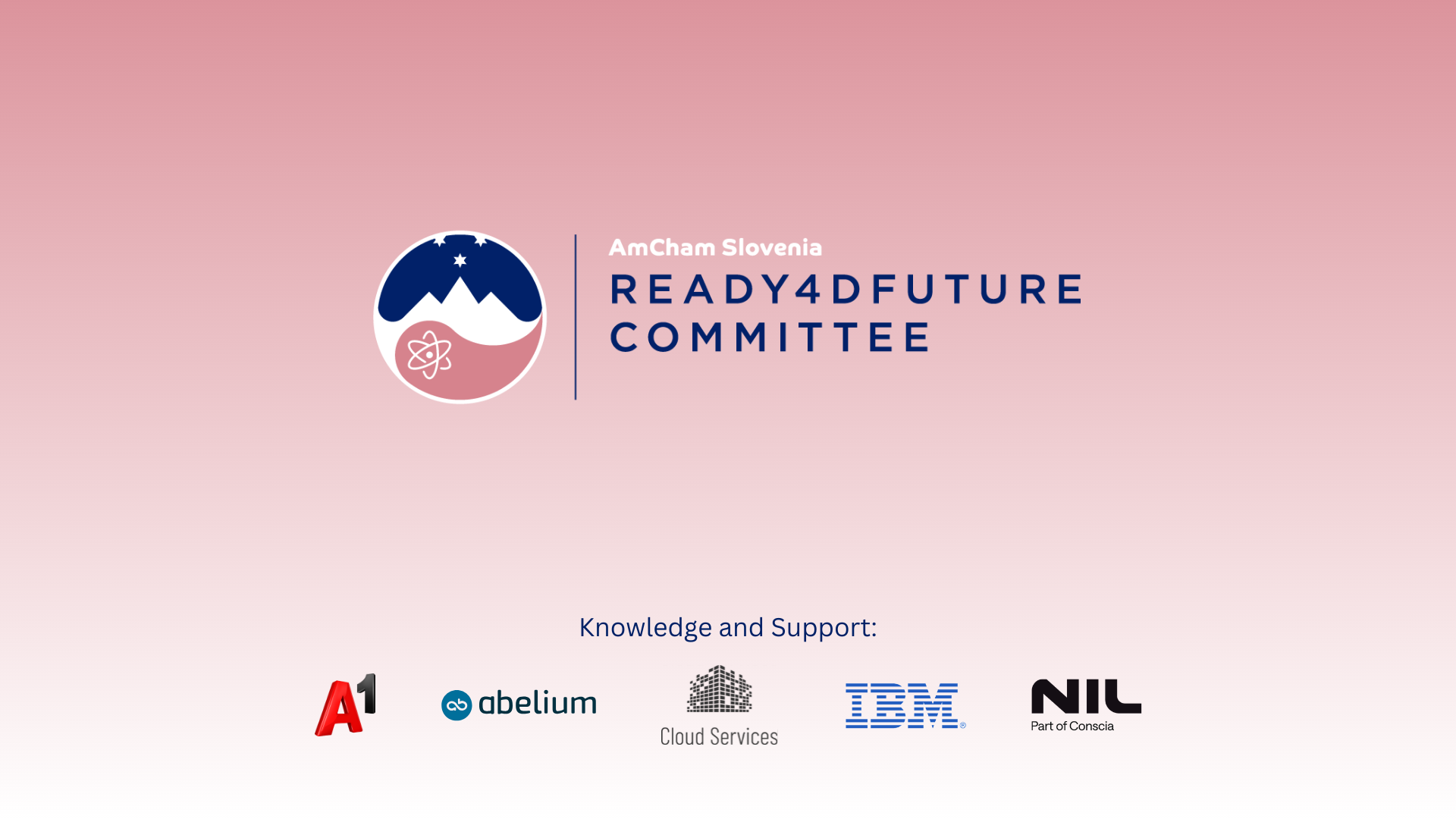In the digital age, we emphasize the key role of people and their readiness for change, their understanding of technology, and their empowerment to use technology for creative purposes. From the challenges of information security and cybersecurity to artificial intelligence and the importance of data, without fundamental knowledge of so-called digital language, we will not be the architects of our own future but merely bystanders

AmCham Ready 4D Future Committee
Key areas of the Committee’s work
Life in the Digital Age
In an age defined by digital technology, the AmCham Ready 4D Future Committee emphasizes the importance of technology that benefits people, society, and the economy, the development of algorithmic thinking, and the creative use of technology.
Since our lives are increasingly interwoven with breakthrough technologies such as artificial intelligence, it is essential that we move away from merely using technology and make an effort to understand its impact on the individual and society. For this reason, the Committee underlines the urgent need for ongoing education and digital literacy among all age groups. The Committee also highlights the irreplaceable role of human qualities such as empathy and creativity in addressing complex problems and encouraging innovation. Ethics play a key role. The Committee, therefore, calls for the responsible use of technology, ethical management of data, and the use of technology for the well-being of society.
“Digital Language” as One of the Key Skills for Young People and the Urgent Introduction of a Mandatory School Subject
We propose the introduction of the mandatory subject “digital language,” covering computer science and information science content in elementary (5th grade to 9th grade) and secondary schools.
In 2016, the RINOS group prepared an action plan for introducing the subject of computer and information science and associated teacher training and envisaged the parallel introduction of digital competencies into all other subjects. We propose calling the subject “digital language” (as a second or third foreign language) since, in this way, we include the full content of the subject, which does not only cover basic knowledge of computing, the development of abstract thinking, and algorithmic reasoning but also the communications of the present and future in the digital age we live in. The knowledge of the “digital language” is not only useful in the field of information science but extends all the way from artistic creation (works of art, music, video) to the use of modern tools, such as a simple program, the cloud, or generative artificial intelligence that simplify life in numerous (multidisciplinary) areas of human existence, understanding, and informed decision-making. There is actually no field in which basic knowledge of computing is not or will not be needed or even essential.
The mere development of digital competencies is not enough if we want our young people to play a part in shaping the (digital) future on an equal footing with other nations. Although it is one of the key skills for lifelong “learning,” without understanding the principles of operation of digital technology and its effective and ethical use, young people will not be equipped with crucial skills for successful functioning in the digital age. The inclusion of digital language as a foreign language in all phases of education enables students not only to master the fundamental concepts of computing but also to address everyday problems with the help of computational (logical) thinking that is creative, abstract, structured, and critical. “Early familiarity with scientific principles is needed to prepare citizens to be capable of making informed decisions about their future.” (RINOS: 15)
Cyber Resilience and Information Security
In an era dominated by information systems, the AmCham Ready 4D Future Committee emphasizes the growing importance of cybersecurity in safeguarding societal well-being. Taking into account the strategic frameworks defined in Slovenia’s National Security Strategy and the EU’s Cybersecurity Strategy, the Committee’s efforts align with the common goal of establishing a powerful system for ensuring cybersecurity. Emphasizing key sub-objectives, from strengthening regulation to fostering international cooperation, the Committee acknowledges the key role of EU initiatives, including the NIS 2 Directive, the Digital Europe Program, and the strengthened status of the European Union Agency for Cybersecurity (ENISA). The proposed Cyber Resilience Act, Cybersecurity Act, and Cyber Solidarity Act are examples of the EU’s commitment to strengthening defenses against emerging cyber threats.
The AmCham Ready 4D Future Committee stands firm in its commitment to measures that are intended to ensure a digital future and contribute to the well-being and security of our connected society.
One of the Committee’s important goals in the area of information security and cybersecurity is raising awareness about legislation, notably the NIS 2 Directive, which is to be transposed into national legislation by October 17, 2024. In light of the constant growth in the number of cyberattacks, which cause significant economic damage, this directive is an attempt to raise the overall level of cybersecurity in the European Union.
Also worth mentioning is the Cyber Resilience Act (CRA), which will enter into force this year and whose purpose is to raise the level of vulnerability management in the development and use of technical solutions in business and everyday life.
Aritificial Intelligence
The AmCham Ready 4D Future Committee strongly advocates a decisive, thought-out, and conscientious approach to integrating artificial intelligence (AI) into our societal framework. As AI develops, individuals, businesses, and the government must play an active part in developing regulatory frameworks, maintaining ethical aspects, and planning the future. AI offers an opportunity for economic growth, innovation, and societal progress, where Slovenia can compete on equal terms with other developed nations. Still, it is vital that, in order to ensure the responsible and sustainable development of AI, a robust regulatory framework – one that is positively oriented towards innovations – is established and that ethical principles are upheld. The EU’s regulatory framework for AI is based on the belief that AI must serve the interests of humanity and respect fundamental rights. The proposed AI Act aims for a harmonized approach to AI among Member States and classifies AI applications into high-risk and low-risk categories. High-risk AI applications are subject to strict requirements, including conformity assessments, data quality standards, and transparency measures. The AmCham Ready 4D Future Committee supports the EU’s efforts to strike a balance between fostering innovation and ensuring the responsible use of AI. A positive legislative framework, together with appropriately addressed ethical aspects, is of key importance in developing and implementing AI systems – start-ups, innovative services, and products.
The Committee advocates a proactive approach to ethical AI that emphasizes transparency and responsibility and aims to benefit society. Cooperation between businesses, academia, and civil society is a suitable environment for establishing ethical guidelines that reflect social norms and values. Artificial intelligence is not only a new challenge that must be addressed but also a valuable opportunity that must be turned into an advantage for Slovenia’s innovation ecosystem. The EU recognizes that regulation alone is not enough when it comes to confronting the technological revolution brought by AI – better support for innovations is needed. The Committee will encourage this dual and positive approach that balances regulation and supports innovation, as this is crucial for guiding the complexity of AI integration and ensuring sustainable development that benefits society as a whole.
Brochure 18 steps for more ICT professionals in Slovenia

Who are the members of the Committee?
See the full list of Committee members.
Join the AmCham Ready 4D Future Committee
For all questions related to the Committee’s work, you can turn to our Committee coordinator Vida Dolenc Pogačnik, our COO and International Cooperation Leader.

Vida Dolenc Pogačnik
COO and International Cooperation Leader

